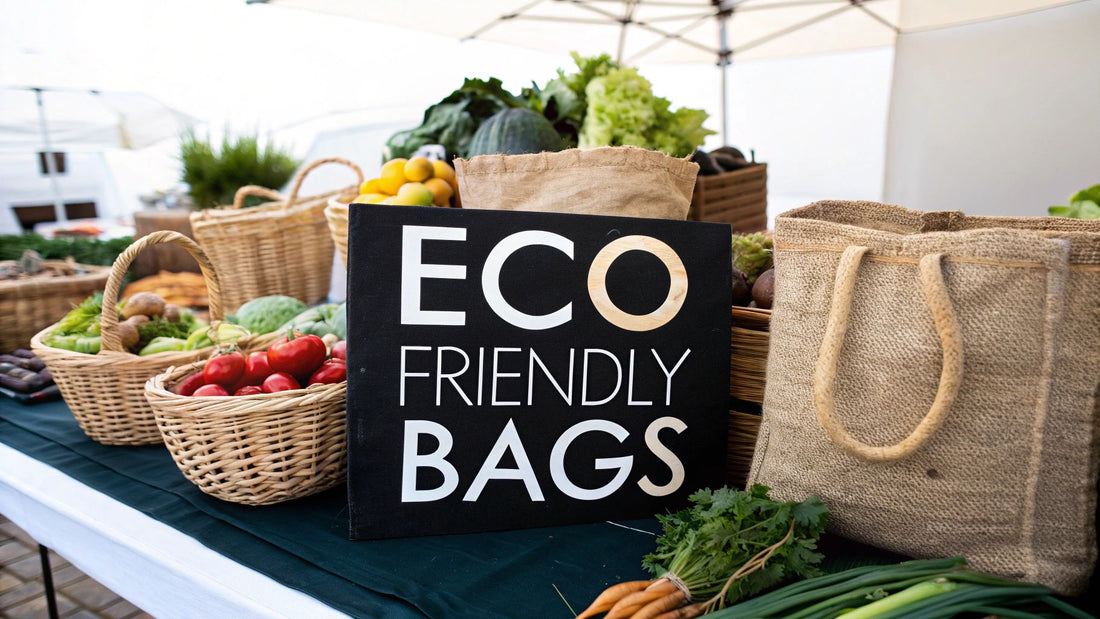
Your Guide to Eco Friendly Shopping Bags: A Small Change with a Huge Impact
Share
Making the switch to eco friendly shopping bags isn't just about carrying your groceries; it's a conscious decision to be part of the solution. It may feel like a small step, but it is one of the most powerful and immediate actions you can take to combat the overwhelming tide of single-use plastic.
Why Your Choice in Shopping Bag Is a Game Changer
Let's face it: we've all seen that chaotic stash of plastic bags under the kitchen sink. It's more than just clutter—it's a stark visual of a global addiction with catastrophic environmental consequences.
Think about this: the average family brings home a staggering 1,500 plastic bags every single year. The devastating truth? Only a tiny fraction of those are ever recycled. The vast majority end up choking our landfills for centuries or, worse, polluting our oceans and killing marine life.
Choosing a reusable bag is your direct intervention. It's not about guilt; it's about empowerment. Every single time you remember your reusable bag, you are actively preventing another piece of plastic from ever being created. You are turning a mundane errand into a meaningful act of defiance against a throwaway culture.
The Power of a Simple Switch
This one small action creates a powerful ripple effect. It sends an unmistakable message that you demand a more sustainable world, inspiring your friends, family, and the very stores you shop at. We are already witnessing this shift in real-time, as consumer pressure forces businesses to adapt.
The global market for sustainable bags isn't just growing; it's exploding. Valued at USD 3.4 billion, it's projected to skyrocket to USD 9.5 billion. This isn't a fleeting trend; it's a revolution led by conscious consumers like you who demand durable, stylish, and reusable alternatives.
This is about more than just reducing waste. It's about fundamentally rewiring our habits for a healthier, circular economy. Your choices are all interconnected, from the bag you carry to how you manage kitchen scraps. For instance, incorporating simple swaps like using the right compostable bags for food waste, builds a truly eco-conscious lifestyle from the ground up.
Ultimately, choosing a reusable bag is an act of hope. It is tangible proof that your individual habits, when multiplied by millions, are the exact force we need to build a cleaner, better world.
A Practical Guide to Eco Friendly Bag Materials
Diving into the world of eco friendly shopping bags can feel overwhelming. You’ll encounter terms like jute, hemp, and recycled PET, but what do they truly mean for your shopping and for the planet? The reality is that not all reusable bags are created equal, and understanding the materials is the key to choosing a bag that becomes a trusted companion for years to come.
Think of it as selecting the right tool for a critical job. A delicate silk scarf has no place on a construction site, just as a massive canvas tote might be overkill for a quick pharmacy run. Every material has a story, a unique set of strengths, and its own environmental footprint.
This guide will demystify the most common materials, moving beyond a simple "green" label to explore how they're grown, how they're made, and how they stand up to the real-world test of a heavy grocery haul.
The image below powerfully illustrates the incredible difference one person can make by consistently choosing to reuse.
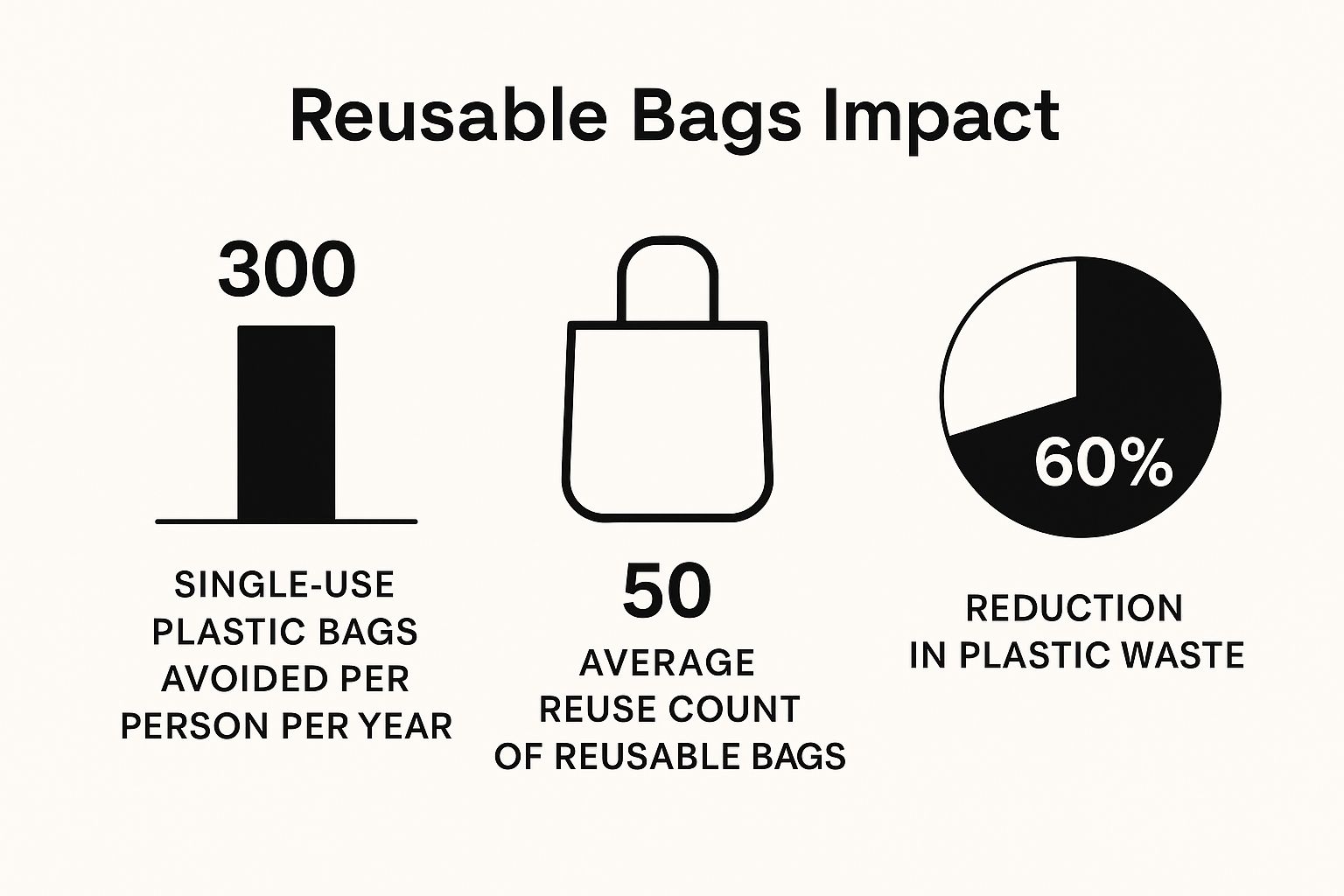
As you can see, even reusing a bag just 50 times a year prevents hundreds of single-use plastic bags from ever entering our fragile ecosystems. That is a direct, measurable impact you can achieve.
Natural Plant-Based Fibers
Many of the best eco-friendly bags begin their life as humble plants. These materials offer a wonderfully rustic, natural feel and are typically biodegradable—a massive win for the environment.
-
Organic Cotton: Soft, foldable, and machine washable, cotton is a classic for good reason. But here's the crucial detail: conventional cotton is a notoriously thirsty crop that relies heavily on pesticides. The only responsible choice is to always opt for organic cotton. It's grown without toxic chemicals and uses significantly less water.
-
Jute: Often called "the golden fiber," jute is an environmental champion. It's a rain-fed crop that requires minimal fertilizer or pesticides to flourish. It produces a coarse, incredibly strong fabric, making jute bags the ultimate workhorse for heavy grocery runs. They are nearly indestructible, but remember they typically can't be machine-washed.
-
Hemp: This is one of nature’s true super-fibers. Hemp grows like a weed (because it is!), needs very little water, and naturally repels pests. Bags made from hemp are exceptionally durable—often stronger than cotton—and they have the unique quality of getting softer with every use. It's a fantastic long-term investment in sustainability.
While these natural fibers are exceptional, they aren't the only sustainable option.
Recycled and Upcycled Materials
Another powerful way to shop sustainably is to give existing materials a second chance at life. This is where fabrics made from recycled materials come in, transforming what would be trash into something incredibly useful.
Take Recycled PET (rPET), for instance. This durable fabric is made by melting down old plastic bottles. Bags made from rPET are lightweight, water-resistant, and surprisingly tough. When you choose an rPET bag, you are directly participating in the cleanup of our planet, pulling plastic waste out of the environment and preventing the need to create new plastic from virgin resources.
This circular economy model is gaining unstoppable momentum. The global market for recycled fabric bags, valued at USD 2 billion, is projected to surge to USD 3.2 billion. This growth isn't happening by accident; it's being driven by people like you demanding smarter, more sustainable solutions. You can discover more insights about the recycled bag market to see the full picture.
Your choices are the engine driving this positive industry-wide change.
Comparing Popular Eco Friendly Bag Materials
To simplify your decision, here’s a quick-glance table comparing the most common materials. Use it to find the perfect match for your lifestyle.
| Material | Key Benefit | Best For | Durability | Consideration |
|---|---|---|---|---|
| Organic Cotton | Soft & Machine Washable | Everyday use, produce, light groceries | Moderate | Less durable with very heavy loads; must be organic. |
| Jute | Extreme Strength & Low Impact | Heavy groceries, bulk items, canned goods | Very High | Coarse texture; usually spot-clean only. |
| Hemp | Unmatched Durability | Everything—it gets better with age | Extremely High | Can be more expensive upfront, but lasts forever. |
| Recycled PET | Lightweight & Water-Resistant | Rainy days, gym clothes, keeping in a purse | High | Made from plastic, though it's recycled. |
Ultimately, the goal is to find a bag that becomes an indispensable part of your routine.
So, What’s the Right Material for You?
In the end, there is no single "best" material. The right choice is the one that seamlessly integrates into your life.
Do you need a bag you can toss in the wash after a run-in with leaky fruit? Organic cotton is your trusted ally. Are you looking for a heavy-duty champion that can handle canned goods and a gallon of milk without breaking a sweat? Jute is the undisputed winner. Want something ultra-lightweight and water-resistant you can stash in your pocket? A recycled PET bag is the perfect solution.
The most eco-friendly bag on the planet is the one you actually use, over and over again. By understanding these materials, you can select a bag that not only aligns with your values but fits so perfectly into your daily life that it becomes a faithful companion on countless shopping trips.
How to Choose a Bag You'll Actually Use
Let's be brutally honest. The most eco-friendly shopping bag has nothing to do with its material—it has everything to do with how many times you remember to bring it with you. A beautiful bag forgotten in a closet has zero environmental impact. The real mission is to find a bag that becomes a natural extension of your life, something you grab without a second thought.
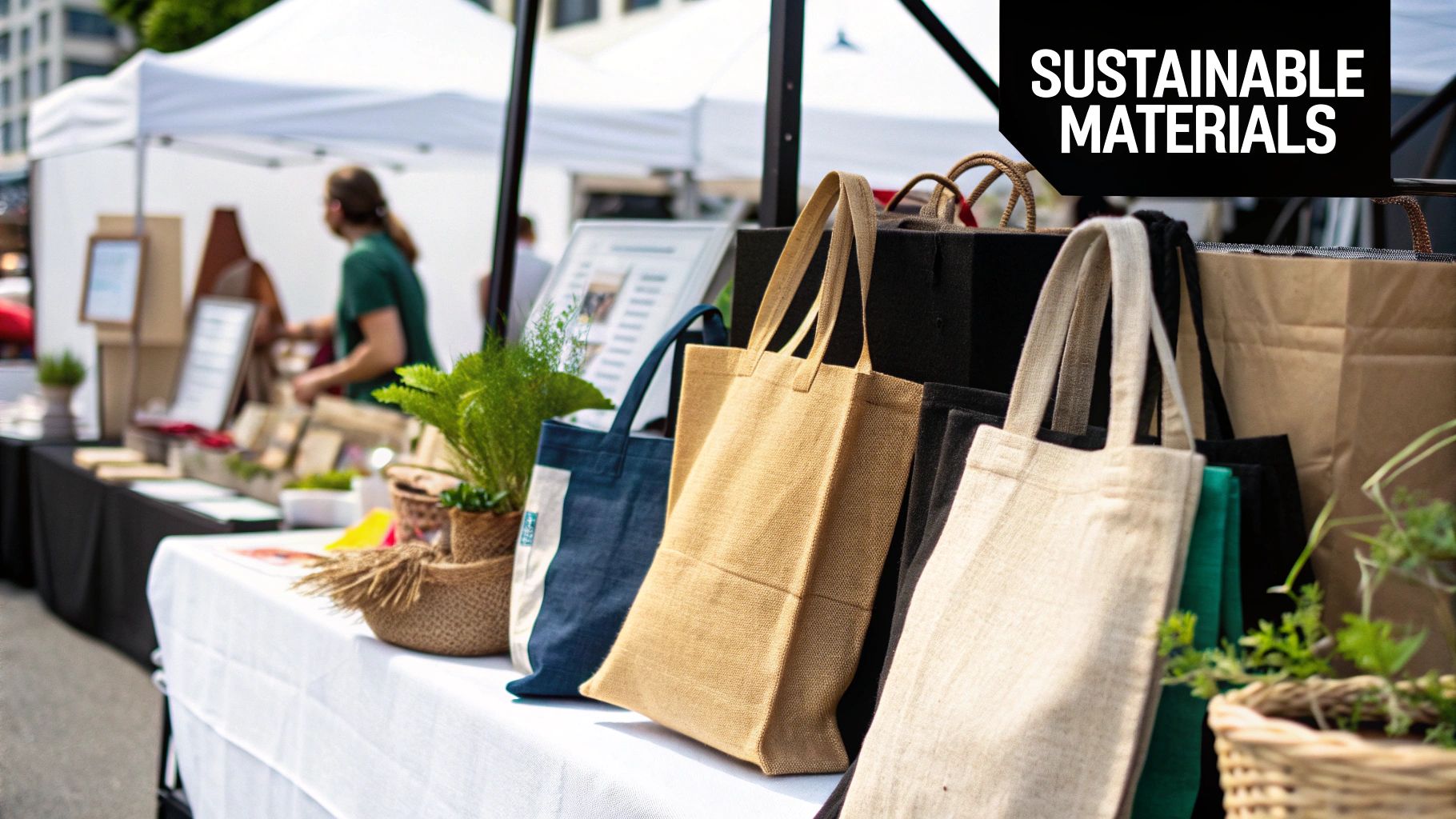
To find that perfect fit, we must think less about fabric and more about function. Your unique shopping habits are the ultimate guide to choosing a bag that becomes a reliable sidekick, not just another purchase gathering dust.
Match the Bag to Your Shopping Style
Think critically about your routine. Are you a "one massive grocery haul for the week" person, or do you prefer to pop into the store for a few items every couple of days? The way you shop dictates the kind of bag you need.
-
For the big weekly grocery run: You need a workhorse. Look for a sturdy jute or canvas bag with a wide, flat bottom. This brilliant design handles heavy items like milk cartons and canned goods with ease and prevents everything from toppling over in your car.
-
For quick, spontaneous trips: A lightweight, foldable bag is a game-changer. Bags made from recycled PET or organic cotton can be compressed into a tiny pouch. Toss it in your purse, backpack, or glove box, and you are always prepared to say no to plastic.
-
For the farmers market: A simple, washable cotton tote is perfect. It’s soft enough to protect delicate fruits and vegetables. Better yet, you can throw it straight into the laundry to keep it fresh for your next trip.
This shift toward practical, sustainable options is becoming the new normal. The global market for eco-friendly bags was valued at USD 2.0165 billion and is projected to climb to USD 3.4069 billion by 2033. This massive growth is proof that people demand bags that truly fit their lives. You can learn more about trends in the eco-friendly bag market to see how these habits are driving innovation.
A Quick Checklist for Choosing Your Perfect Bag
Before you commit, take a moment to run through these questions. Answering them honestly will lead you to a bag you'll use for years—and that's what truly matters.
The most sustainable bag is the one that becomes an extension of your routine—effortless, reliable, and always there when you need it.
- How will I carry it? Do you need long shoulder straps for a comfortable haul, or are short handles sufficient for quick trips from the car to the house?
- How will I store it? Does it need to fold small enough to vanish into a pocket? Or will it live in the trunk of your car, always ready for action?
- What will I carry in it? Be realistic about your typical load. Are you carrying heavy books, boxes with sharp corners, or delicate produce? The material must be up to the challenge.
- How will I clean it? If you’re using it for groceries, spills are guaranteed. Is the bag machine washable, or is it spot-clean only?
When you prioritize your own needs over aesthetics, you are making a choice that is not just sustainable, but profoundly practical.
Making Your Reusable Bags Last a Lifetime
An eco-friendly shopping bag is only as "eco" as the number of times you use it. Ensuring that bag lasts isn't just about getting your money's worth; it's about maximizing your positive impact. With a little simple care, you can keep your bags clean, strong, and ready for hundreds of shopping missions.
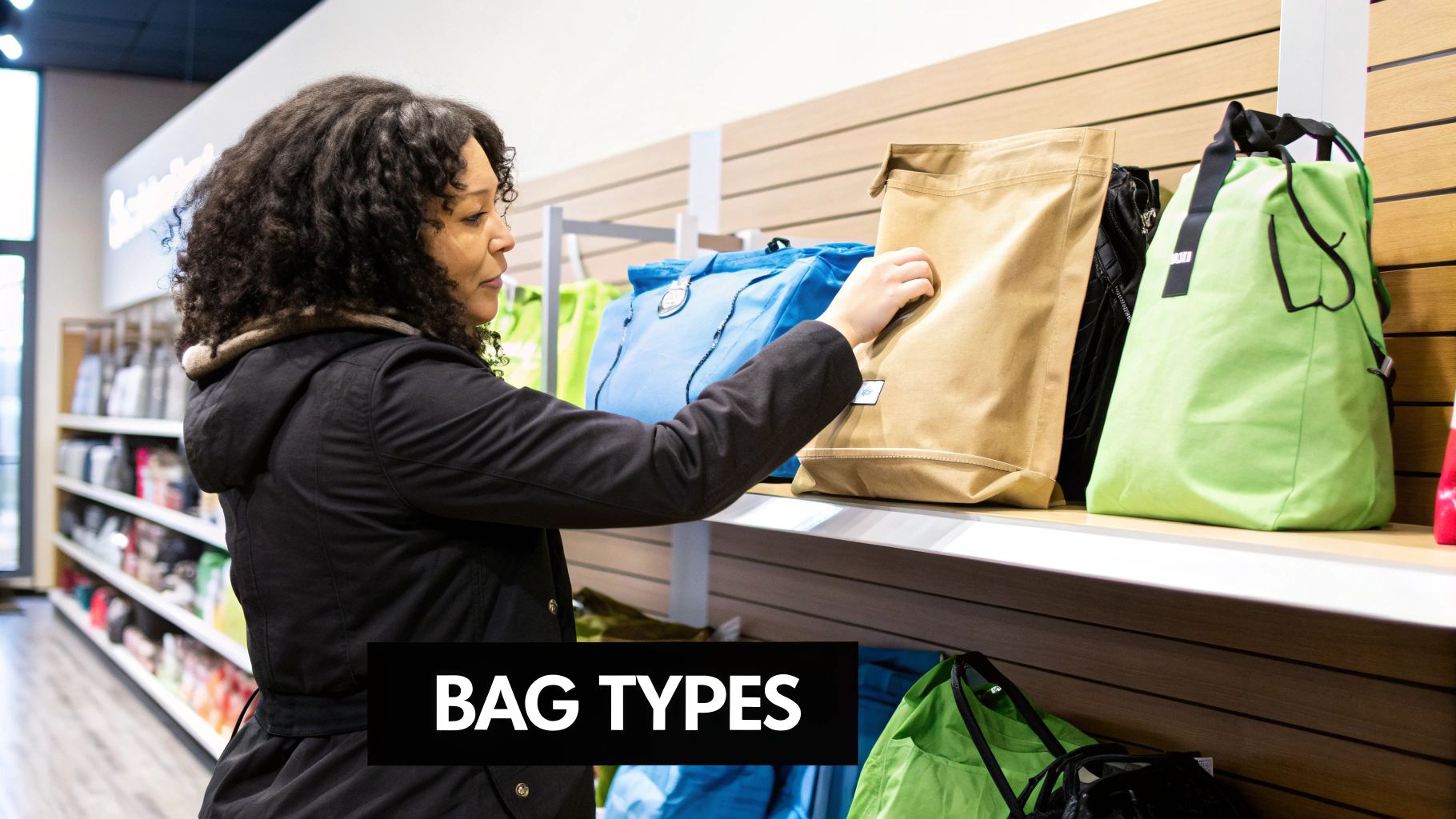
Think of your reusable bag like a high-quality kitchen knife. You wouldn't just toss it in a drawer unwashed, would you? Of course not. You keep it sharp and ready for the next task. Your shopping bags deserve that same level of care to ensure they perform flawlessly for years to come.
Simple Cleaning for Different Materials
Not all fabrics are created equal, and they certainly don't all want to be cleaned the same way. Throwing a jute bag in the washing machine is a fast track to ruining it, so knowing how to care for your specific material is crucial.
-
Cotton and Recycled PET: These are typically the easiest to maintain. Simply turn them inside out and toss them in the washing machine with your regular detergent. A hot water cycle is excellent for eliminating any lingering bacteria. You can tumble dry them on low, but air drying is even better to prevent shrinking and save energy.
-
Jute and Hemp: These rugged natural fibers are incredibly durable, but they despise being soaked. Avoid the washing machine at all costs. Instead, spot-clean any messes with a damp cloth and a touch of mild soap. The most important step? Let them air dry completely before storing them.
When you're carrying raw meat, fish, or even loose produce, proper sanitation is a must. Regular cleaning stops harmful bacteria from growing, preventing cross-contamination and keeping your food safe.
Smart Storage and Easy Repairs
Where you keep your bags is just as important as how you clean them. We've all left a bag in a hot car, but a damp bag in a dark space is a perfect breeding ground for mildew. Always—always—make sure your bags are completely dry before folding them. Store them somewhere cool and dry where air can circulate.
Even the sturdiest bags will eventually show signs of a life well-lived. A fraying handle or a tiny hole doesn't mean its journey is over. A few simple stitches are often all it takes to repair a strap, giving your bag a new lease on life and keeping it out of the landfill for that much longer.
This mindset of reducing waste is the very core of a sustainable life. It’s the same principle that powers practices like composting. If you're ready to take that next step, you can see how this applies to other household items in our guide to the best compostable trash bags.
Turning Good Intentions into an Unbreakable Habit
You've chosen the perfect eco friendly shopping bags, learned how to care for them, and you're ready to make a difference. But let's be honest—there's one small hurdle that trips up even the most committed person: actually remembering to take the bags from the car into the store. That "darn, I left them in the trunk again" moment is the final barrier between your intentions and your impact.
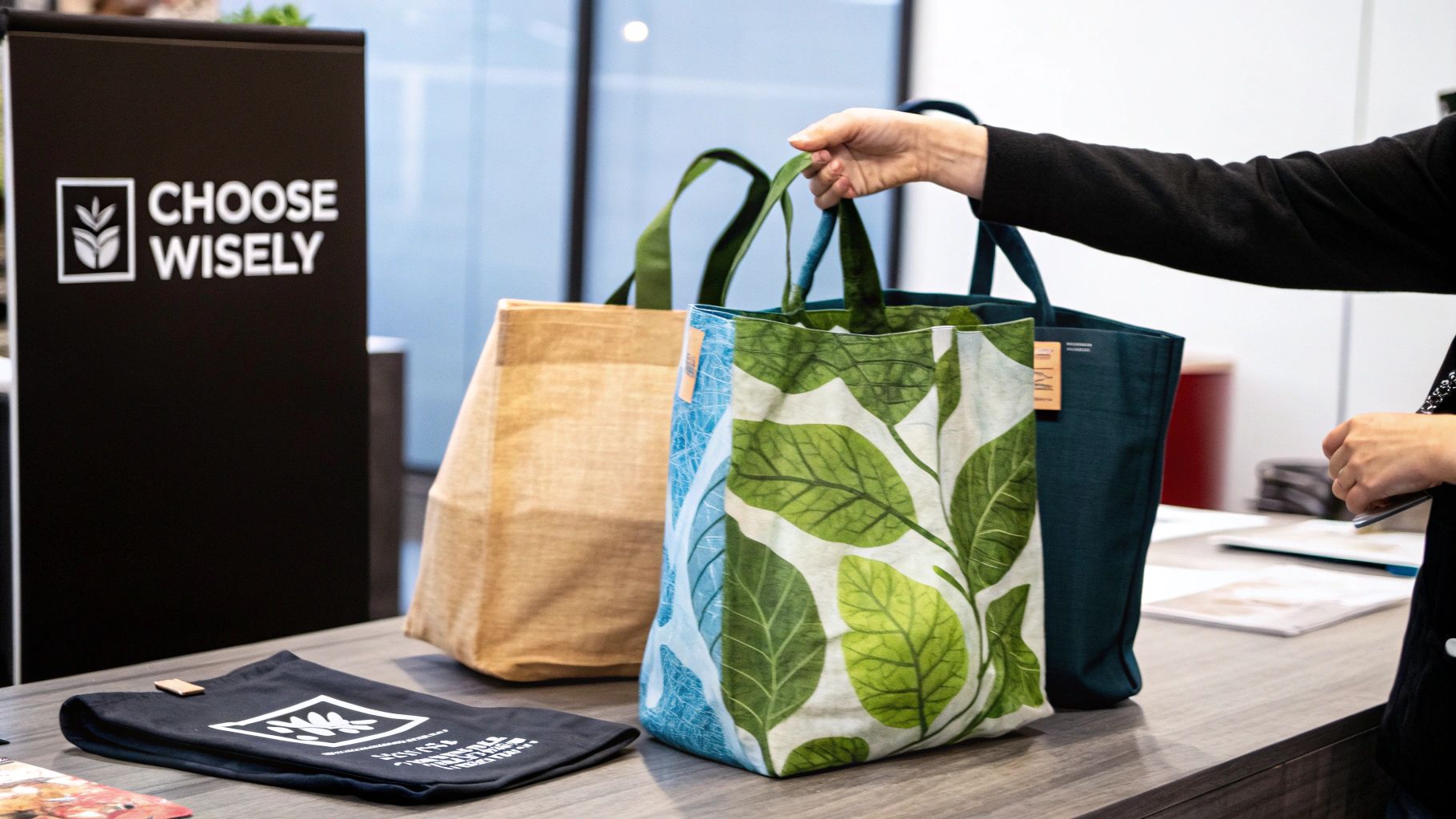
The secret isn't just "trying harder." It's about building a new routine so deeply ingrained that it runs on autopilot. A powerful psychological trick called habit stacking is your key to success. The concept is simple: you link the new action (grabbing your bags) to a habit you already do without thinking (like turning off your car or grabbing your purse).
Your new, automatic routine upon parking becomes: grab wallet, grab phone, grab bags. By piggybacking the new habit onto an existing one, you're no longer relying on fallible memory. You're building reliable muscle memory.
Create Unforgettable Reminders
To truly cement this habit, you must engineer your environment to make your bags impossible to ignore. Vague promises of "I'll remember next time" are destined to fail. You need a system of undeniable visual cues.
-
The Car Stash: Don’t just toss your bags in the trunk where they're out of sight, out of mind. Instead, hang them on the back of a headrest or keep a small, foldable one right in your glove compartment. Make them impossible to miss.
-
The Door Hook: Hang a bag or two on the doorknob you use every single time you leave the house. You will physically have to move them to walk out the door. It is a foolproof reminder.
-
The Shopping List Hack: This is perhaps the simplest and most effective trick. Before you write a single item, scrawl "BRING BAGS" in huge, bold letters at the very top of your shopping list.
Your environment is more powerful than your willpower. By strategically placing your bags where you can’t miss them, you create a system that guarantees success, even on your most hectic days.
Building these small routines is one of the most effective ways to live more sustainably. This same principle of consistency is crucial when you look at broader strategies for how to reduce plastic waste in all areas of your life. By making this one small action an effortless habit, you ensure your choice creates a real, lasting impact.
The Ripple Effect of Your Reusable Bag
It's easy to dismiss choosing an eco friendly shopping bag as a minor personal decision. But what if that simple act creates a powerful ripple that extends far beyond your own shopping cart?
Think of it this way: every time you walk into a store with your own bag, you are casting a vote. It is a vote for sustainability, a clear and direct signal to retailers about what you, the customer, value.
This isn't just wishful thinking—it's the fundamental principle of how markets work. As more of us choose to reuse, businesses are forced to pay attention. This rising tide of consumer demand is what pressures companies to fundamentally rethink their operations, from eliminating single-use plastics at checkout to scrutinizing their own supply chains.
Driving Industry-Wide Change
Your simple choice to reuse a bag helps fuel a much larger movement. When millions of people make that same decision, it creates an undeniable market for innovation. Companies begin competing to design better, tougher, and more stylish reusable bags, pushing the entire industry toward greener materials and more ethical production.
This collective action does more than just give us better bags; it helps shift corporate priorities for good.
A single consumer who uses a branded reusable bag is 26% more likely to do business with that company. This proves that sustainability isn't just good for the planet—it's smart business. It gives brands a powerful financial incentive to embrace the change you are demanding.
That direct connection between our daily choices and corporate action is how real, lasting change happens.
Your habit, multiplied by millions, becomes an unstoppable force. It directly reduces the demand for new plastic production and provides irrefutable proof of a collective will for a cleaner future. You aren't just carrying groceries; you're carrying the momentum for a more sustainable world. This is how you become an active part of the solution.
Still Have Questions About Eco-Friendly Bags?
Switching to reusable bags feels like an easy win, but it's natural to have questions. Let's tackle some of the most common ones so you can feel confident and empowered in your choice.
Are Reusable Bags Really Better for the Planet?
Yes, unequivocally—but with one critical condition: you have to use them. A lot. It's true that producing a single cotton tote requires more energy and water than one flimsy plastic bag. But that's not the whole story. The environmental "cost" of your reusable bag is divided by every single shopping trip.
To truly make a difference, a cotton bag must become your trusted companion for hundreds of trips. The real environmental victory is achieved when you find a durable bag you love and use it for years, effectively preventing hundreds or even thousands of plastic bags from ever being created.
How Do I Keep My Bags Clean and Safe for Food?
This is a crucial question. The short answer? Wash them regularly. This is non-negotiable for any bag that has carried raw meat, fish, or even unwashed produce.
Treat your grocery bags with the same diligence as a kitchen counter. You wouldn't prepare a salad where raw chicken just sat, would you? A quick wash is essential to prevent cross-contamination and keep your family's food safe.
A smart system is to designate specific bags for raw foods—ones that are easy to machine wash. For materials like cotton or recycled PET, a hot cycle with your usual detergent is perfect. For jute bags that can't be machine-washed, simply spot-clean them and ensure they air dry completely before storage.
What Do I Do When My Bag Is Worn Out?
When your faithful bag finally reaches the end of its long life, your first thought should be to keep it out of the landfill. Can it be repaired? A small tear or a broken strap can often be fixed with a few simple stitches, extending its life even further.
If it’s truly beyond repair, investigate local textile recycling programs. Many clothing stores and community recycling centers have drop-off bins. And if your bag is made from 100% natural fibers like cotton or jute, you can cut it into strips and add it to your compost pile—just be sure to remove any plastic tags, zippers, or synthetic threads first.
Ready to find a bag that will stick with you for the long haul? terravera offers a collection of high-quality, durable bags built to become a reliable part of your routine. Find your perfect sustainable companion today at https://www.myterravera.com.
